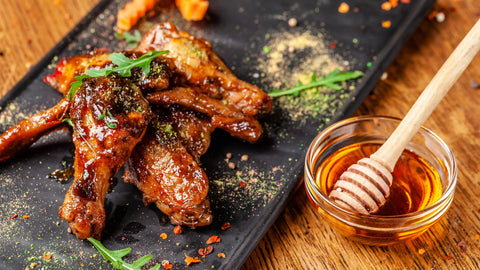Honey is not just a natural sweetener, but also one of the most versatile and effective ingredients for marinating meat and fish. This ancient culinary technique, rediscovered by modern gastronomy, completely transforms the texture and flavor of proteins, delivering dishes with refined taste and surprisingly tender consistency.
The Science of Honey Marinades
Honey marinades are not just about taste—they're based on precise biochemical mechanisms that transform animal proteins at the molecular level.
The Enzymatic Action of Honey
Honey contains natural enzymes, primarily glucose oxidase and invertase, which play a fundamental role in the marinating process:
-
Gentle proteolysis: honey enzymes begin to break down surface proteins in meat, creating natural tenderness
-
Antimicrobial action: honey's antibacterial properties protect meat during the marinating process
-
Moisture retention: honey's hygroscopic power retains the meat's natural juices
The Role of Natural Sugars
The two main sugars in honey, glucose and fructose, have specific effects on marinating:
-
Caramelization: during cooking, honey sugars create a golden, flavorful crust
-
Osmotic penetration: small sugar crystals facilitate marinade penetration into tissues
-
Flavor balancing: natural sweetness contrasts the acidity of other ingredients like vinegar or lemon
pH Balance
Honey has a slightly acidic pH (3.2-4.5) that contributes to the tenderizing process without being as aggressive as highly acidic marinades that could "cook" the meat.
Honey Varieties for Every Type of Marinade
Not all honeys are equal when it comes to marinades. Each variety brings unique characteristics that pair perfectly with specific types of meat and fish.
Delicate Honeys for White Meat and Fish
-
Neutral and delicate flavor
-
Ideal for: chicken, turkey, white fish, shellfish
-
Characteristics: doesn't crystallize, distributes evenly
-
Benefits: enhances natural flavors without overpowering them
Linden Honey
-
Fresh and mentholated notes
-
Ideal for: blue fish, duck, rabbit
-
Characteristics: delicate floral aroma
-
Benefits: contrasts the saltiness of fatty fish
Medium Intensity Honeys for Red Meat
-
Balanced aromatic complexity
-
Ideal for: pork, veal, young lamb
-
Characteristics: rounded flavor profile
-
Benefits: versatility of use, adapts to many preparations
Heather Honey
-
Balsamic and persistent notes
-
Ideal for: ribs, roasts, grilled meats
-
Characteristics: gelatinous consistency that adheres well
-
Benefits: deep penetration into meat
Intense Honeys for Flavorful Meats
-
Strong flavor and slightly bitter notes
-
Ideal for: beef, mature lamb, game
-
Characteristics: dark color and intense aroma
-
Benefits: contrasts the richness of red meats
Arbutus Honey
-
Characteristic bitter aftertaste
-
Ideal for: wild boar, venison, wild duck
-
Characteristics: unique and unmistakable personality
-
Benefits: eliminates excessive gamey flavor
Signature Marinade Recipes for Every Occasion
Delicate Marinade for White Fish
Ingredients for 4 servings:
-
3 tablespoons acacia honey
-
2 tablespoons extra virgin olive oil
-
Juice of 1 lemon
-
1 sprig fresh thyme
-
1 garlic clove, finely minced
-
Sea salt to taste
-
White pepper to taste
Preparation:
-
Mix honey with oil until you get a smooth emulsion
-
Add lemon juice gradually, continuing to mix
-
Incorporate thyme, garlic, salt, and pepper
-
Immerse fish in marinade for 30-45 minutes
-
Cook in non-stick pan for 3-4 minutes per side
Marinating time: 30-45 minutes
Recommended cooking: pan, grill, steam
Aromatic Marinade for Chicken
Ingredients for 4 chicken breasts:
-
4 tablespoons wildflower honey
-
3 tablespoons balsamic vinegar
-
2 tablespoons olive oil
-
1 teaspoon sweet paprika
-
1 teaspoon dried oregano
-
2 garlic cloves, crushed
-
Salt and black pepper to taste
Preparation:
-
Dissolve honey in a large bowl
-
Add balsamic vinegar and mix well
-
Incorporate oil, spices, and garlic
-
Marinate chicken breasts for 2-4 hours in refrigerator
-
Cook in oven at 400°F (200°C) for 25-30 minutes
Marinating time: 2-4 hours
Recommended cooking: oven, grill, pan
Beef Marinade
Ingredients for 1.8 lbs (800g) beef:
-
5 tablespoons chestnut honey
-
4 tablespoons soy sauce
-
2 tablespoons red wine vinegar
-
2 tablespoons sesame oil
-
1 fresh hot pepper
-
1 inch (3 cm) fresh ginger, grated
-
2 garlic cloves, minced
Preparation:
-
Slightly warm honey to make it more fluid
-
Mix with soy sauce and vinegar
-
Add oil, hot pepper, ginger, and garlic
-
Marinate meat for 4-8 hours or overnight
-
Cook at high temperature to sear, then medium heat
Marinating time: 4-8 hours
Recommended cooking: high-temperature grill, cast iron pan
Exotic Marinade for Salmon
Ingredients for 4 salmon steaks:
-
3 tablespoons linden honey
-
2 tablespoons white miso
-
1 tablespoon sake (or dry white wine)
-
1 tablespoon sesame oil
-
1 teaspoon ginger powder
-
Sesame seeds for garnish
Preparation:
-
Mix honey and miso until you get a smooth paste
-
Add sake and sesame oil
-
Incorporate ginger powder
-
Marinate salmon for 1-2 hours maximum
-
Cook in oven at 350°F (180°C) for 12-15 minutes
Marinating time: 1-2 hours maximum
Recommended cooking: oven, grill, non-stick pan
Marinating Times
Marinating time is crucial for achieving perfect results. Too little and the marinade doesn't penetrate; too much and you risk excessively altering the texture.
Fish and Seafood
-
Delicate white fish: 30-60 minutes
-
Fatty fish (salmon, tuna): 1-2 hours
-
Shellfish: 20-30 minutes
-
Mollusks: 15-20 minutes
White Meats
-
Chicken (breasts): 2-4 hours
-
Chicken (thighs and wings): 4-6 hours
-
Turkey: 3-6 hours
-
Rabbit: 4-8 hours
Red Meats
-
Veal: 2-4 hours
-
Pork: 4-8 hours
-
Beef (steaks): 4-6 hours
-
Beef (roasts): 8-12 hours
-
Lamb: 6-12 hours
-
Game: 12-24 hours
Cooking Techniques for Honey Marinades
Grilling
The grill is ideal for honey marinades, but requires attention to prevent sugars from burning:
-
Medium temperature: avoid flames that are too high
-
Indirect cooking: for large pieces, use the cooler zone of the grill
-
Constant monitoring: turn frequently for even browning
-
Gentle finishing: in the last minutes, move meat to the cooler area
Oven Cooking
The oven offers perfect temperature control:
-
Preheating: always to correct temperature before placing food inside
-
Temperature: 350-400°F (180-200°C) for most preparations
-
Humidity: add a bowl of water to keep meat juicy
-
Final browning: last 5 minutes with broiler on if necessary
Pan Cooking
Perfect for small pieces and quick cooking:
-
Preheated pan: before adding oil
-
Medium-high heat: for initial searing
-
Gradual reduction: lower heat to complete cooking
-
Final rest: let meat rest a few minutes before serving
Perfect Pairings: Honey, Meat, and Accompaniments
Chicken with Acacia Honey
Ideal accompaniments:
-
Grilled vegetables (zucchini, peppers, eggplant)
-
Herb pilaf rice
-
Arugula and cherry tomato salad
Salmon with Linden Honey
Ideal accompaniments:
-
Steamed asparagus
-
Quinoa with peas
-
Yogurt and dill sauce
Beef with Chestnut Honey
Ideal accompaniments:
-
Rosemary roasted potatoes
-
Sautéed mushrooms
-
Red wine reduction
Chef's Tips for Perfect Marinades
Meat Preparation
-
Room temperature: remove meat from refrigerator 30 minutes before marinating
-
Gentle scoring: make small surface cuts to aid penetration
-
Drying: pat meat dry with paper towels before marinating
Marinating Techniques
-
Non-metallic containers: use glass or ceramic
-
Complete coverage: ensure marinade covers entire surface
-
Periodic mixing: turn meat every hour for even marinating
Honey marinades represent an ancient culinary technique that finds new life and infinite creative possibilities in modern gastronomy. Science teaches us that honey is not just an ingredient that adds sweetness, but a true ally in protein transformation, capable of tenderizing, flavoring, and protecting meat and fish during cooking.
Experimenting with different honey varieties means discovering a world of authentic and natural flavors, where each type of honey tells the story of the territory from which it comes and pairs perfectly with specific types of meat and fish.
In our store you'll find a curated selection of artisanal honeys, each with its own distinctive characteristics, perfect for creating unforgettable marinades. From delicate acacia honey to intense chestnut honey, each variety will allow you to explore new dimensions of taste and bring dishes with authentic and refined flavor to your table.
Begin your journey into honey marinade cuisine and discover how this millennial ingredient can transform every meal into a unique and memorable gastronomic experience.



